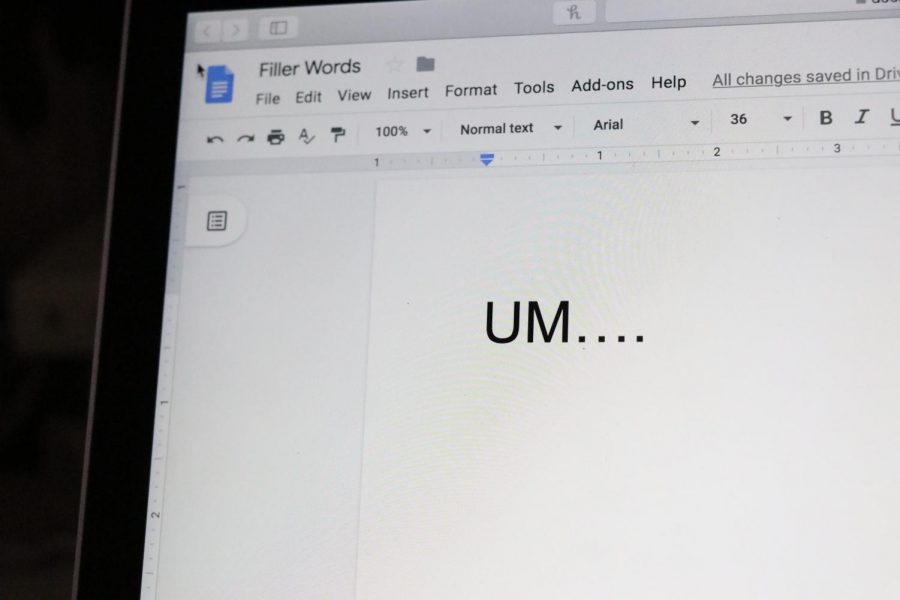So, Like, Why Am I Saying Um?
TO USE OR NOT TO USE Filler words are everywhere in our everyday lives. They’re in our speech, our writing, imbedded into our very society. They are looked down upon as a lazy way of speaking, but are they really as bad as people make them seem? There are drawbacks, but there are advantages too. So filler words; to use or not to use.
November 5, 2019
We have all had that moment, that class where time just can’t seem to pass fast enough. Where we count the filler words of others to—dare I say—fill the time. People use them a lot. The reality is, they’re are taking over our daily lives. They have infiltrated every level of speech, from casual to professional. They take many forms, from short sounds to full words. There are filler words in almost every language, usually taking the form of common linguistic phonics. They have many causes: they can occur due to non-fluency in the spoken language, resulting in breaks for word retrieval or grammar. In fact, word retrieval is a common reason for filler words, either for a word not commonly used in day-to-day speech or for a second language. They can also be a result of nervousness, as a way to try to make oneself more comfortable, or having divided attention, as they can serve as a pause to check on something else. Fillers are so widespread that most people do not even register them—not consciously at least.
In a study on filler words by BYU, they found that they are somewhat of a double-edged sword. On one hand, filler words project a lack of professionalism on the audience. They can make the speaker seem unprepared, unconfident, or even uneducated. On the other hand, use of them can actually make the speaker appear more truthful, as the person will subconsciously connect to the person, and listen and process what they are saying on a deeper level.
In that same study, BYU recorded the number of fillers a person can use before losing audience interest and credibility. They found that a person can use an average of 1.28 fillers per 100 words before losing their audience. However, the effect of those filler words can depend on the type of people in a speaker’s audience. In an article by Penn State, they found that different genders will interpret fillers in different ways. Take for example the filler sound “mhm.” For females, that sound is often used to prompt the speaker to continue. For males, however, the sound is used in agreement. This can lead to miscommunication between genders. Additionally, different fillers have different effects on certain ages. Generations tend to have different filler words, but will almost always claim the younger generation’s version is worse. For example, an adult may use the words “so” and “right” often in their speech, whereas a younger person may use the fillers “like” and “um.” Some filler words— or more accurately, sounds— have stayed true from generation to generation, such as “uh” or “you know.” Some of these words have an interesting way of integrating themselves into the world, into both professional and casual settings.
As the professional world is currently dominated by an mostly older generation, older filler words are hardly even recognized for what they are and are mostly accepted as common words. These include “so,” for when one feels awkward or does not know how to begin. Or “right,” tacked on to the end of a sentence, giving the speaker a chance to collect their thoughts. Meanwhile younger generations tend to have their filler words in the middle of their sentences. For example, junior Dinitri Acuna admitted, “I use ‘like’ a lot, especially in messaging.” This brings another interesting idea to the table: when our younger generation takes the center stage, will our filler words become the new norm? Freshman Bryan Mathews certainly thinks so, saying that they could “definitely become a part of daily speech.” Concurrently, however, they are, for the most part, unprofessional. Senior Adam Bussey agreed, saying, “It shows he [the speaker] hasn’t rehearsed and practiced for the speech if he uses filler words, but he remains more professional if he abstains from using them.”
So in the end, does it matter? To fill or not to fill, that is the question. On one hand, filler words can project a sense of confidence and professionality. But on the other hand, having they can make the speaker seem more approachable and truthful. Luckily, there is an alternative to fillers. It may seem unnatural at first, but in the long run, it is a good choice. Simply pause. By pausing, you not only give yourself a chance to prepare your next thought, but you give the audience a chance to digest what you just said. All things said and done, however, it boils down to personal preference. In terms of others, there is nothing much anyone can do. Sophomore Courtney Breeden agrees, saying, “We should just accept [filler words] are there.”



